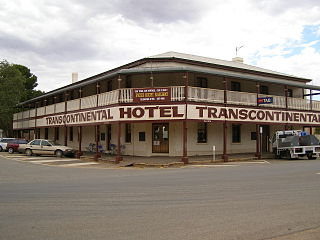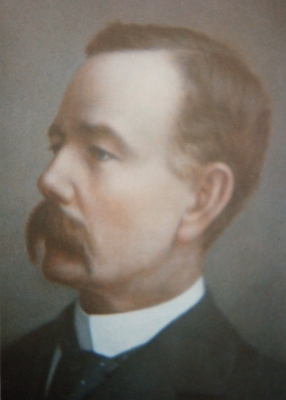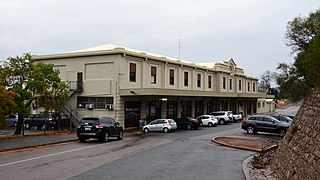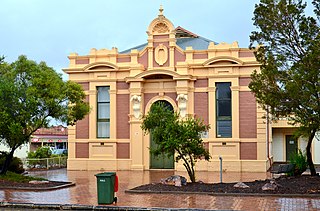Related Research Articles
The Australian electoral system comprises the laws and processes used for the election of members of the Australian Parliament and is governed primarily by the Commonwealth Electoral Act 1918. The system presently has a number of distinctive features including compulsory enrolment; compulsory voting; majority-preferential instant-runoff voting in single-member seats to elect the lower house, the House of Representatives; and the use of the single transferable vote proportional representation system to elect the upper house, the Senate.

Port Augusta is a small city in South Australia.

Quorn is a small town and railhead in the Flinders Ranges in the north of South Australia, 39 kilometres (24 mi) northeast of Port Augusta. At the 2016 census, the locality had a population of 1,230, of which 1,131 lived in its town centre.

The former Central Australia Railway, which was built between 1878 and 1929 and closed in 1980, was a 1,241 km (771 mi) 1067 mm narrow gauge railway between Port Augusta and Alice Springs. A standard gauge line duplicated the southern section from Port Augusta to Maree in 1957 on a new nearby alignment. The entire Central Australia Railway was superseded in 1980 after the standard gauge Tarcoola–Alice Springs Railway was opened, using a new route up to 200 km to the west. A small southern section of the original line between Port Augusta and Quorn has been preserved as the Pichi Richi Tourist Railway.

The Division of Grey is an Australian electoral division in South Australia. The division was one of the seven established when the former Division of South Australia was redistributed on 2 October 1903 and is named for Sir George Grey, who was Governor of South Australia from 1841 to 1845.

The Trans-Australian Railway, opened in 1917, runs from Port Augusta in South Australia to Kalgoorlie in Western Australia, crossing the Nullarbor Plain in the process. As the only rail freight corridor between Western Australia and the eastern states, the line is strategically important. The railway includes the world's longest section of completely straight track.

Thomas Butterfield was an Australian politician and minister in the South Australian Parliament.

William Tennant Mortlock was a South Australian grazier and politician.
Lindsay Gordon Riches, CMG was a South Australian politician. He was a Labor Party member of the South Australian House of Assembly from 1933 to 1970, representing the electorates of Newcastle (1933-1938) and Stuart (1938-1970). He was Speaker of the South Australian House of Assembly from 1965 to 1968 under Frank Walsh and Don Dunstan. He was also a long-time mayor of the City of Port Augusta from 1936 to 1970, with Port Augusta gaining city status during his tenure.

Port Augusta railway station is a rail station located on the Adelaide-Port Augusta railway line in Port Augusta, South Australia.
The Marree railway line is located in the Australian state of South Australia.
This is a list of members of the South Australian House of Assembly from 1915 to 1918, as elected at the 1915 state election:

Thompson Green was an Australian politician who represented the South Australian House of Assembly multi-member seats of Port Adelaide from 1910 to 1915 and West Torrens from 1915 to 1918. He was a member of the United Labor Party until 1917, when he left to join the National Party in the 1917 Labor split.
Edward Nowell Twopeny was an Australian politician who represented the South Australian House of Assembly multi-member seat of Newcastle from 1917 to 1918, representing the Liberal Union.
The Corporate Town of Port Augusta West was a local government area in South Australia centred on the suburb of Port Augusta West. It was gazetted on 6 October 1887. They met in council chambers in Loudon Road, which ceased to be used by its successor council upon its amalgamation, but remained in use by the community until their demolition in the 1940s, at which time the building was described as "definitely unsafe". It was not uncommon for positions to be elected unopposed or without any nominations at all; in the election of November 1903, no one nominated for either mayor or councillor.
The Corporate Town of Davenport was a local government area in South Australia that existed from 1887 to 1932 on land now located within the suburb of Port Augusta.

The Port Augusta Town Hall is a heritage-listed former town hall at 54 Commercial Road, Port Augusta. It was Port Augusta's seat of local government from 1887 to 1983.
The District Council of Hawker was a local government area in South Australia from 1888 to 1997, centred on the town of Hawker. At its creation it was the northernmost local government area in the state.

The Quorn Town Hall is a heritage-listed former town hall at 20 Railway Terrace, Quorn, South Australia. It was added to the South Australian Heritage Register on 12 January 1984; it is also listed on the Register of the National Estate.
The Transcontinental is a weekly newspaper published in Port Augusta, South Australia which dates from October 1914. It was later sold to Rural Press, previously owned by Fairfax Media, but now an Australian media company trading as Australian Community Media.
References
- 1 2 3 4 5 "History of South Australian Elections 1857 - 2006 Volume 1: ECSA". Archived from the original on 2 March 2014. Retrieved 11 September 2016.
- 1 2 "Statistical Register of the Legislature, 1836-2006" (PDF). Parliament of South Australia. Archived from the original (PDF) on 12 March 2011. Retrieved 11 September 2016.
- ↑ "THE FEDERAL ELECTIONS". The Advertiser . Vol. LIX, no. 18, 221. Adelaide. 8 March 1917. p. 7. Retrieved 11 September 2016– via National Library of Australia.
- ↑ "STATE BY-ELECTIONS". The Advertiser . Vol. LIX, no. 18, 277. Adelaide. 12 May 1917. p. 9. Retrieved 11 September 2016– via National Library of Australia.
- ↑ "NEWCASTLE BY-ELECTION". Observer . Vol. LXXIV, no. 5, 648. South Australia. 2 June 1917. p. 29. Retrieved 11 September 2016– via National Library of Australia.
- ↑ "State By=Elections". The Transcontinental . South Australia. 18 May 1917. p. 4. Retrieved 7 October 2016– via National Library of Australia.
- ↑ "Declaration of the Poll". Transcontinental. South Australia. 1 June 1917. p. 1. Retrieved 11 September 2016– via National Library of Australia.
- ↑ "Newcastle". The Register . Vol. LXXXII, no. 22, 000. Adelaide. 14 May 1917. p. 9. Retrieved 11 September 2016– via National Library of Australia.